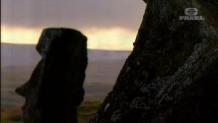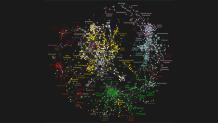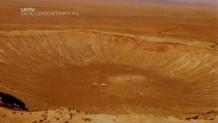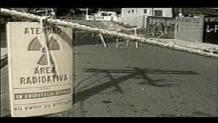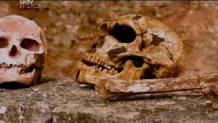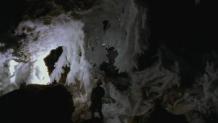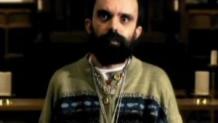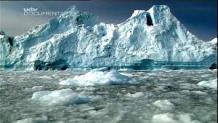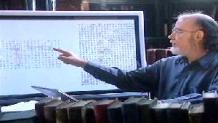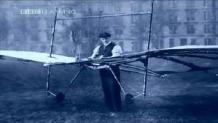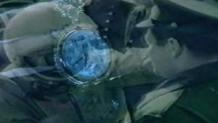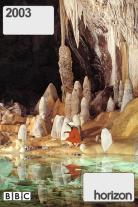
Horizon (1964)
Horizon tells amazing science stories, unravels mysteries and reveals worlds you've never seen before.
User rating:
2003x01 The Mystery Of Easter Island
09 January, 2003 9:00 pm
On Easter Day 1722, Dutch explorers landed on Easter Island. A civilisation isolated by 4,000km of Pacific Ocean was about to meet the outside world for the first time in centuries. The strangers were about to find something very strange themselves - an island dotted with hundreds of huge stone statues and a society that was not as primitive as they expected. The first meeting was an immense clash of cultures. (Bloody too: the sailors killed ten natives within minutes of landing.) Where had the Islanders originally come from? Why and how had they built the figures? Modern science is piecing together the story, but it is far too late for the Easter Islanders themselves.
They were virtually wiped out by a series of disasters - natural and man made - that brought a population of 12,000 down to just 111 in a few centuries. The Island's inhabitants today all have Chilean roots, making solving the mysteries even harder. There is no one to ask about the first people of Easter Island. Altho
2003x02 Living Nightmare
16 January, 2003 9:00 pm
Sleeping is an essential part of everyone's life yet it remains little understood is barely understood. You might think it's a relaxing recharge but in fact your brain is working harder at times overnight than when you're conscious in the day.
Fresh insight into why and how we sleep has come from studying people with sleep disorders, especially sufferers of narcolepsy. The condition means that people fall asleep many times a day, completely out of the blue. A less known symptom is paralysing attacks, that can cause narcoleptics to fall to the ground - unable to move - several times a day. If a way can be found to ease their symptoms, it could open the way to helping any of us to control our sleep patterns and perhaps even to go without rest while staying alert.
Gaynor Carr has been nodding off routinely since the age of seven. Her narcolepsy has made holding down a job impossible and made her question the idea of ever having children. Gary Beattie used to work in construction, un
2003x03 Averting Armageddon
23 January, 2003 9:00 pm
The Earth is under constant bombardment. Each year, many fragments of debris hit our planet. Fortunately for us, most are so small that they burn up harmlessly in the atmosphere.
However, there are hundreds of larger asteroids orbiting near the Earth. Many scientists now believe that one of these hit the Earth 65 million years ago, killing the dinosaurs, along with 90% of all life on the planet. What is more, it is only a matter of time before the Earth is hit again.
Experts warn that nuclear weapons might not destroy an approaching asteroid. But Jay Meloch thinks he can use the power of the Sun to nudge an asteroid away from the Earth.
Until recently, no one took the asteroid threat very seriously. Yet the evidence that we are in danger is on our own doorstep. We need only look at the cratered surface of the Moon to realise that it has been pounded by impacts throughout its history.
2003x04 Dirty Bomb
30 January, 2003 9:00 pm
A dirty bomb is a radiological weapon but unlike a nuclear bomb, its purpose is to contaminate rather than destroy. It uses normal explosives to disperse radioactive materials in the local environment, creating a hazard to health that could last for years unless cleaned up.
The relative ease of making such a bomb means it is a potent terrorist weapon but Horizon's investigation shows that the risk to health from most such devices need not be great. It also underlines the need for governments to act to secure radioactive sources from falling into criminal hands. Horizon deliberately avoids outlining the production process in any detail.
Horizon publishes the results of specially commissioned research, modelling two possible dirty bomb scenarios: attacks on either London or Washington DC. The main conclusion is that the health risks from a dirty bomb explosion are localised to people who are close to the incident or are in contact with the contamination. Although the modelled attac
2003x05 Sexual Chemistry (Update)
13 February, 2003 9:00 pm
The drug Viagra revolutionised the treatment of sexual dysfunction in men on its launch five years ago. An accidental discovery, the tablet that gave impotent men the chance once more to have natural erections became the fastest selling pill in history and has earned its manufacturer, Pfizer, over $6bn.
The search is now on for a similar drug that could help women. Research is revealing that female sexuality is more complex than expected. For women suffering from a loss of desire many scientists believe that drugs acting on the brain may be the way forward. A pioneering Scottish study may have identified just such a drug and begun testing it scientifically.
An erection is achieved by filling the erectile tissue of the penis with blood. Blood vessels widen to allow blood in and then constrict to maintain the pressure. Male impotence was long thought to be a psychiatric effect, a result of stress, anxiety or depression. Medical advice was that there was not much to be done. Some pa
2003x06 The Day We Learned To Think
20 February, 2003 9:00 pm
Understanding of humans' earliest past often comes from studying fossils. They tell us much of what we know about the people who lived before us. There is one thing fossils cannot tell us; at what point did we stop living day-to-day and start to think symbolically, to represent ideas about our environment and how we could change it? At a dig in South Africa the discovery of a small piece of ochre pigment, 70,000 years old, has raised some very interesting questions.
Anatomically modern humans (Homo sapiens) emerged in Africa roughly 100,000 years ago. We know from fossil evidence that Homo sapiens replaced other hominids around them and moved out of Africa into Asia and the Middle East, reaching Europe 40,000 years ago.
Prof Richard Klein believes art is a landmark in human evolution. Unquestionable art that's widespread and common suggests you're dealing with people just like us. No other animals, after all, are able to define a painting as anything other than a collection of co
2003x07 Trial and Error
27 February, 2003 9:00 pm
It was the simplest idea but one with enormous potential. If a gene is defective in the human body, just replace it with one that works properly. Gene therapy would mean that genetic disorders would become a thing of the past. Cancer would be cured, as would cystic fibrosis and hundreds of other genetic illnesses. Scientists were justifiably excited about the idea but, this enthusiasm that would end up costing one young man his life.
Jesse Gelsinger was born with a liver disorder, a rare condition called ornithine transcarbamylase (OTC) deficiency that stops the liver metabolising ammonia. People with the disease can suffer from brain damage or coma. At its most extreme the illness is fatal.
Jesse was lucky, able to lead a fairly normal life although he had a daily cocktail of drugs to control his condition. Jesse wanted to help others. When he was offered a chance to take part in a medical trial to test the safety of using gene therapy for OTC deficiency, he was keen to particip
2003x08 Earthquake Storms
06 March, 2003 9:00 pm
Earthquakes are among the most devastating natural disasters on the planet. In the last hundred years they have claimed the lives of over one million people. Earthquakes are destructive mainly because of their unpredictable nature. It is impossible to say accurately when a quake will strike but a new theory could help save lives by preparing cities long in advance for an earthquake.
The surface of the Earth is made up of large 'tectonic' plates. These plates are in slow but constant motion. When two plates push against each other friction generates a great deal of energy. For this reason earthquakes occur most frequently on tectonic fault lines, where two plates meet. However these fault lines run for thousands of kilometres; predicting exactly where a quake will occur is nearly impossible.
In 1992, Dr Ross Stein was monitoring a large earthquake in a town in California called Landers. Three hours later, there was another quake 67km away at Great Bear. Stein believed that this wa
2003x09 Life On Mars (Update)
27 March, 2003 9:00 pm
Are we alone in the Universe? Or are there aliens somewhere in space? New evidence suggests not only might other life-forms be out there, they may even be living on the planet right next door to us - Mars.
Recent discoveries have shown that Mars has all the ingredients for life, including water. Now the Mars Odyssey probe, launched in April 2001, has detected huge frozen areas of permafrost, just like that found in the Antarctic on Earth.
According to astronomers, the position of this frozen slush could hold the key to Mars' mysterious water cycle. And the surface ice may hide something even more exciting below.
2003x10 The Secret Life Of Caves
03 April, 2003 9:00 pm
Set against the back drop of awe inspiring geological beauty, a strange scientific adventure sets out to discover how a mineral clad cave network - the height of a 30 storey building and the length of six football fields - came to exist deep below the Guadalupe Mountains in North America.
But this journey soon unravels a multitude of inexplicable phenomena and obscure geological formations, leading to the discovery of extreme rock-eating microbes - a testimony from primordial Earth and a glimpse of life elsewhere in the Solar System.
Geologists believed that all limestone caves were formed by rain and underground water percolating through cracks in the rocks. Absorbing carbon dioxide from the soil, this water becomes weak carbonic acid, nibbling away at limestone, etching out networks of subterranean caves.
2003x11 God On The Brain
17 April, 2003 9:00 pm
Rudi Affolter and Gwen Tighe have both experienced strong religious visions. He is an atheist; she a Christian. He thought he had died; she thought she had given birth to Jesus. Both have temporal lobe epilepsy.
Like other forms of epilepsy, the condition causes fitting but it is also associated with religious hallucinations. Research into why people like Rudi and Gwen saw what they did has opened up a whole field of brain science: neurotheology.
The connection between the temporal lobes of the brain and religious feeling has led one Canadian scientist to try stimulating them. (They are near your ears.) 80% of Dr Michael Persinger's experimental subjects report that an artificial magnetic field focused on those brain areas gives them a feeling of 'not being alone'. Some of them describe it as a religious sensation.
His work raises the prospect that we are programmed to believe in god, that faith is a mental ability humans have developed or been given. And temporal lobe epileps
2003x12 Flight 587
08 May, 2003 9:00 pm
265 people died when an Airbus operated by American Airlines crashed into the New York suburb of Queens in November 2001. The twin-engined jet took off from John F Kennedy Airport in fine conditions but hit trouble after just 67 seconds. In the following 38 seconds the plane started to disintegrate before nose-diving into the residential Rockaway area of the city.
Everyone aboard was killed (along with five people on the ground) so the crash investigators had to rely on eyewitnesses, recovered parts of the plane and information from both air traffic control and the flight data recorders. The discovery of the Airbus' vertical tailfin hundreds of metres from the fuselage immediately focussed attention on whether the pilots lost the ability to control the plane.
Why the tailfin detached was at the heart of the investigation by the National Transportation Safety Board. The airline and the manufacturer blame each other for creating a situation in which the stress on the rudder and tai
2003x13 SARS: The True Story
29 May, 2003 9:00 pm
Severe Acute Respiratory Syndrome didn't even have its name in February 2003, when it struck its first known victim, Johnny Cheng, in Hanoi, Vietnam. Within days, an international effort led by the World Health Organization (WHO) had massed scientific expertise to fight the mystery illness and avert the nightmare scenario of an uncontrollable pandemic sweeping the globe.
Amid attempts to quarantine high risk groups of people, it seemed only fear could spread more rapidly than the disease itself. Nothing was known about the condition - where it had come from, how it was passed on, how to spot it, contain it or treat it. The infection was described merely as 'flu-like'. But if this was a type of influenza, it was one that killed up to 15% of its sufferers.
The doctor treating Mr Cheng, who first contacted the WHO about the unusual symptoms, was one of six medics to die of SARS at the hospital. But the alarm had been raised and the Organization began to pull together a response. Col
2003x14 The Big Chill
13 November, 2003 9:00 pm
Remember that long, hot summer? You might never see its like again. And all that talk of global warming? Forget it.
This season's first Horizon reveals that a growing number of experts fear Britain could be heading for a climate like Alaska. Our ports could be frozen over. Ice storms could ravage the country, and London could see snow lying for weeks on end. It would be the biggest change in the British way of life since the last Ice Age.
The first signs that such a disaster could happen came from deep within the ice sheet of Greenland. Scientists discovered that the Earth's past was littered with sudden, drastic drops in temperature.
The big question was: could it ever happen again? Clues came from tiny shells at the bottom of the Atlantic; a huge glacier on the move in Arctic and some alarming discoveries in the far north of Russia.
In the end there came the terrifying revelation: the Gulf Stream, that vast current of water that keeps us warm, could be cut off.
Accordi
2003x15 The Bible Code
20 November, 2003 9:00 pm
This week Horizon investigates the science behind the Bible Code.
What he can see is truly horrific; according to Drosnin, the world could end in an atomic holocaust - in 2006.
It sounds preposterous yet Drosnin claims to have serious scientific backing. Behind his findings lies the work of one of the world's most brilliant theoretical mathematicians, an Israeli professor called Eliyahu Rips.
In 1994, using exactly the same ancient code, Michael Drosnin accurately predicted the assassination of the Israeli Prime Minister Yitzak Rabin - twelve months before it occurred.
Drosnin's books on the Bible Code have been translated into most of the world's major languages and are read by millions of people. If he's right, he's stumbled on one of the most important discoveries ever made.
2003x16 Last Flight of the Columbia
27 November, 2003 9:00 pm
Mixing powerful and deeply moving footage with telling forensic analysis, Horizon reveals what really went wrong on the Space Shuttle Columbia. The film's final revelation is telling. If NASA had acted differently, all seven astronauts could have been brought back to Earth alive.
The film begins with the astronauts' final moments and shows the haunting scenes at Mission Control at the moment the disaster struck.
What then follows is a disturbing detective story as the investigators gradually realise that the tragedy was caused by the failure of a small panel on the shuttle's left wing that had been built to be indestructible.
No one had ever thought such an accident was possible. It has led to the shuttle being grounded for the foreseeable future.
But that wasn't all. The film also shows that NASA had a number of options to bring the crew back safely - if only it had commandeered a spy telescope to visually inspect the damage. It could even have launched a rescue mission.
2003x17 The Hunt for an AIDS Vaccine
04 December, 2003 9:00 pm
Horizon tells the microbiological detective story in which some of the best brains in science have been pitted against the most extraordinary bug the world has ever seen.
In 1984 it was discovered that HIV was the cause of AIDS. Straight away, there were confident predictions that there would be a vaccine ready for testing in just two years.
Back then, just 1,292 deaths from AIDS had been reported. Now the figure is 25 million dead. By 2010 it is predicted there will be 85 million infections and 70 million deaths. And after 20 years there is still no sign of a vaccine.
Despite work of dazzling complexity, the ambition of so many brilliant scientists has been constantly thwarted. Just as a vaccine seems to be working, the AIDS virus alters itself, and ten to fifteen years of work, and millions of pounds, go down the drain. These bitter disappointments are only compounded by the desperate human urgency of the work.
This is a story where the clock doesn't stop ticking.
2003x18 Percy Pilcher's Flying Machine
11 December, 2003 9:00 pm
Could an unknown Englishman have been the first person ever to fly?
To mark the hundredth anniversary of the Wright brothers inaugural flight, Horizon tells the remarkable story of Percy Pilcher.
He could have been the most famous aviator of them all. Four years before the Wright brothers, he had constructed his own aeroplane. But on the day it was due to take off for the very first time, something so terrible happened that he was denied the chance of ever flying it. So Horizon has rebuilt his long lost flying machine to see if Percy Pilcher, the British amateur, could have claimed the glory and been the first person ever to fly.
This film mixes dramatic reconstruction with fabulous contemporary scenes and gripping science. With a specially assembled team of historians, aviation experts and our own test pilot, Horizon painstakingly rebuilds Pilcher's flying machine and puts it to the test. The results will leave you cheering.
2003x19 Time Trip
18 December, 2003 9:00 pm
Horizon's Time Trip is a thrilling journey deep into the strangeness of cutting-edge physics - a place where beautiful, baffling ideas are sometimes indistinguishable from the utterly crazy.
On this journey, we meet a time-travelling pizza, a brilliant mathematician in a ski mask and even God. The journey ends with a strange and dark conclusion - one which calls into question our very existence.
Ever since Einstein showed it was theoretically possible, the quest to travel through time has drawn eccentric amateurs and brilliant scientists in almost equal numbers. The amateurs include Aage Nost, who demonstrates his time machine in front of the cameras. The professionals include the likes of Professor Frank Tipler of Tulane University. His time machine sounds good - but it would weigh half the mass of the galaxy.
There is, however, one way that time travel to the past could be possible. And it would be much more convenient. Future civilisations could use computers to create exac
Video Gallery
Coming Soon...
Photo Gallery
Coming Soon...

